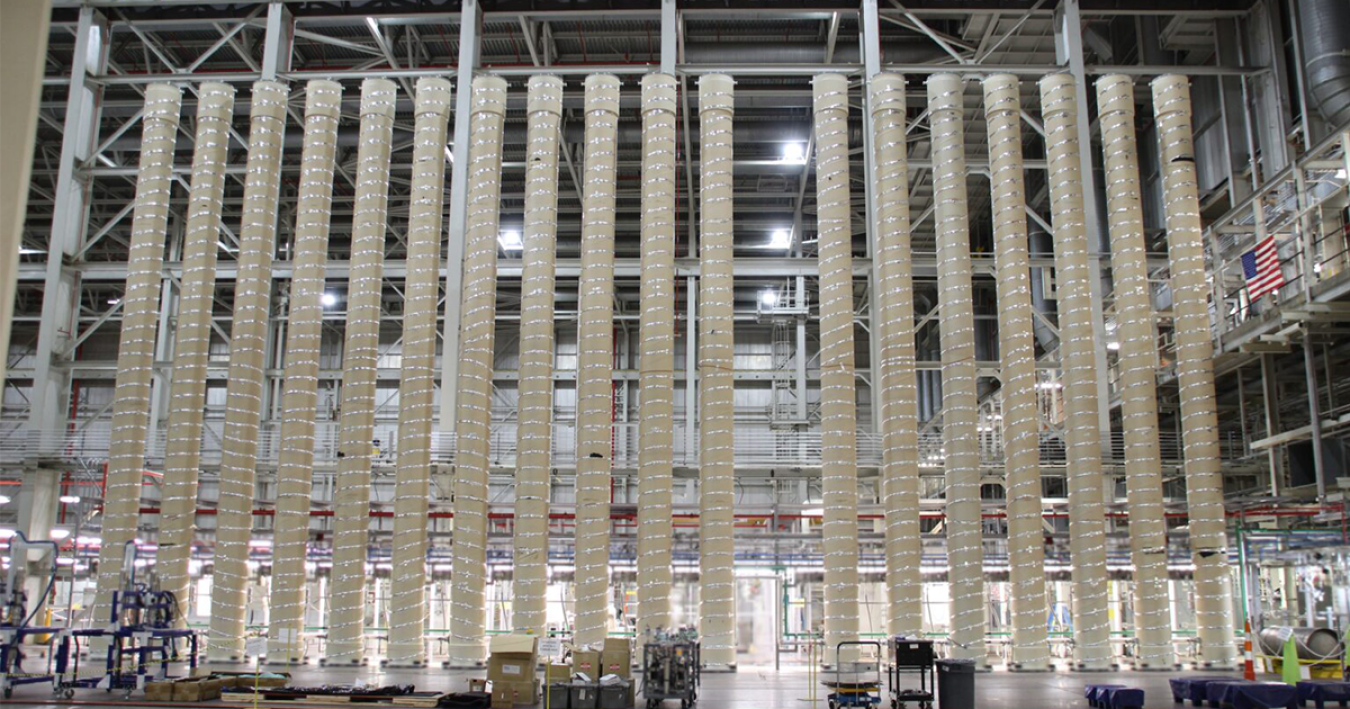 Centrus Energy Corp has made its first delivery of High-Assay, Low-Enriched Uranium (HALEU) to the US Department of Energy, (DOE). This completes Phase One of its contract with DOE by demonstrating its HALEU production process. Phase Two will now begin, which requires a full year of HALEU production at the rate of 900 kilograms a year using its American Centrifuge Plant (ACO) in Piketon, Ohio.
Centrus Energy Corp has made its first delivery of High-Assay, Low-Enriched Uranium (HALEU) to the US Department of Energy, (DOE). This completes Phase One of its contract with DOE by demonstrating its HALEU production process. Phase Two will now begin, which requires a full year of HALEU production at the rate of 900 kilograms a year using its American Centrifuge Plant (ACO) in Piketon, Ohio.
Centrus began enrichment operation at Piketon in October, two months ahead of schedule. ACO completed its operational readiness reviews in June with the Nuclear Regulatory Commission NRC) and received approval to use uranium at the facility, It then conducted final systems tests and other preparations to begin enriching limited quantities of uranium hexafluoride gas into HALEU.
HALEU fuel contains uranium enriched to 5-20% uranium-235 (higher than the 3-5% typically used in light water reactors). It is required by most of the advanced reactor designs being developed under DOE’s Advanced Reactor Demonstration Program (ARDP).
Currently there is no commercial supply chain to support HALEU production, which prompted DOE to launch a programme to stimulate the development of a domestic supply. Under the competitively-awarded, cost-share contract signed DOE in 2022, Centrus was required to produce 20 kg of HALEU by the end of this year.
This builds on a three-year project with DOE to manufacture and assemble 16 advanced centrifuges into an enrichment cascade. ACO expects to meet demonstration requirements by producing 20kg of 19.75% enriched HALEU by the end of the year.
"Centrus is proud to be pioneering American HALEU production, with our first delivery of the fuel that is urgently needed to support the demonstration and commercialization of advanced reactors," said Centrus President & CEO Daniel B Poneman. "This critical milestone is essential to meeting the Department's near-term HALEU needs, while laying the groundwork for the full restoration of America's lost domestic uranium enrichment capacity. We are committed to working with the Department and industry to build a public-private partnership so that we can scale up production in the coming years to meet the full range of commercial and national security requirements for enriched uranium."
DOE takes delivery of the HALEU on site in Piketon and is obligated to provide the HALEU storage cylinders to collect the HALEU from the cascade; Centrus has constructed a storage facility where the HALEU will be kept until it is needed.
Phase One included a 50 percent cost share requirement for Centrus, with DOE and Centrus each contributing about $30m of the $60m overall cost. In Phase Two of the contract, DOE will pay Centrus on a cost-plus incentive fee basis for the HALEU the company produces.
HALEU is required for most of the next-generation reactor designs currently under development. It will be used to help fuel the initial cores of two demonstration reactors awarded under DOE’s Advanced Reactor Demonstration Program and support fuel qualification and the testing of new reactor designs. In addition to this demonstration project, DOE is supporting several efforts to provide more access to HALEU. Current activities include recycling spent nuclear fuel from government-owned research reactors and acquiring HALEU through purchase agreements with domestic industry partners to spur demand for additional HALEU production and private investment in the nation’s nuclear fuel supply infrastructure.
The capacity of ACO’s current 16-centrifuge cascade is modest but with sufficient funding and offtake commitments, Centrus says it could significantly expand production. A full-scale HALEU cascade, consisting of 120 centrifuge machines, with a combined capacity to produce approximately 6,000 kg of HALEU a year (6 MTU/year), could be producing HALEU within 42 months after securing the necessary funding.
Centrus noted that, with the appropriate support, it could add a second HALEU cascade six months later and subsequent cascades every two months after that. That would mobilise hundreds of union workers in Ohio to build and operate the plant, while supporting thousands of direct and indirect jobs across a nationwide manufacturing supply chain. The Piketon facility has ample space for the thousands of machines that will be needed to meet the growing demand for enriched uranium in the decades to come.
“Meeting this first production mark is very exciting for everyone involved in the Piketon demonstration project,” said Jon Carmack, DOE’s Deputy Assistant Secretary for Nuclear Fuel Cycle & Supply Chain. “Centrus reached this accomplishment ahead of schedule and has proven the domestic capability to produce HALEU for the next generation of nuclear reactors.”
Image: Advanced centrifuge cascade in Piketon, Ohio (courtesy of US DOE)



